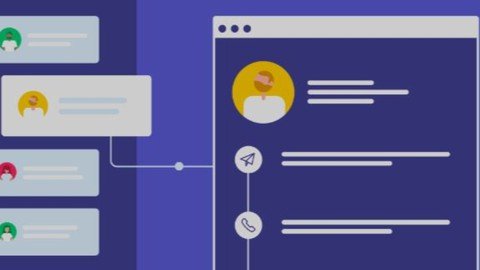
Published 5/2023
MP4 | Video: h264, 1280×720 | Audio: AAC, 44.1 KHz
Language: English | Size: 971.46 MB | Duration: 2h 50m
Harnessing the Power of Python and SQLite: Building Dynamic Applications from Scratch
What you’ll learn
Setting up a Python and SQLite environment for database management.
Creating a SQLite database
Executing SQL Statements from Python
Designing a database schema for a contact management system.
Creating tables in a SQLite database.
Inserting data into SQLite tables using Python.
Executing SQL queries from Python.
Retrieving data from a SQLite database using Python.
Updating existing data in a SQLite database using Python.
Deleting data from a SQLite database using Python.
Understanding the use of SQL commands like SELECT, INSERT, UPDATE, and DELETE.
Gaining confidence in their ability to create a fully functional application from scratch.
Requirements
Basic Programming Knowledge: Familiarity with basic programming concepts such as variables, loops, and functions is essential. This course assumes that you have at least beginner-level experience with programming, ideally in Python.
Python Fundamentals: You should have a fundamental understanding of Python programming, including data types, control flow, functions, and error handling. If you’re new to Python, consider taking a beginner’s course in Python first.
Computer Literacy: Basic computer skills, including installing software, managing files, and using a text editor, are required.
Access to a Computer: You will need access to a computer (Windows, Mac, or Linux) as the course involves hands-on programming exercises.
Internet Connection: As this is an online course, a stable internet connection is necessary
Motivation to Learn: Lastly, a willingness to learn and explore is essential. Expect to encounter challenges, especially if you’re new to programming or databases, and be prepared to spend time outside of the course schedule to practice and reinforce what you’ve learned.
While not a strict requirement, familiarity with SQL (Structured Query Language) and basic database concepts would be beneficial but not necessary
Description
Welcome to “Creating a Contact Database Management System with Python and SQLite” – a comprehensive, hands-on course designed to equip you with the knowledge and skills to create a fully functional contact database management system.This course is perfect for learners who have a basic understanding of Python and are eager to apply it in practical, real-world projects. SQLite, a self-contained, serverless, and zero-configuration database engine, is the perfect tool for our purpose, and we will teach you how to harness its power using Python.You’ll learn about SQL data manipulation language commands such as SELECT, INSERT, UPDATE, and DELETE, and how to execute them in Python.You will learn how to design a database schema for a contact management system. “Creating a Contact Database Management System with Python and SQLite” is more than just a programming course. It’s an opportunity to learn by doing. By the end of this course, you will have a fully functional application that you can use, showcase in your portfolio, or even expand for commercial use.Whether you’re a budding developer, a data enthusiast, or a professional looking to expand your skill set, this course offers a unique opportunity to learn, grow, and create. Join us and embark on this exciting journey of learning and innovation.
Overview
Section 1: Python and SQLite Set Up
Lecture 1 Introduction
Lecture 2 What is Python
Lecture 3 Installing Python on Windows
Lecture 4 Installing Python on Macs
Lecture 5 Note on Text Editors
Lecture 6 Installing Visual Studio Code
Lecture 7 What is SQLite
Lecture 8 Download and Install SQLite
Lecture 9 Install DB Browser for SQLite
Lecture 10 Database Design
Lecture 11 Create a database and table
Section 2: Creating the application Frontend User Interface
Lecture 12 What is Tkinter
Lecture 13 What we will create
Lecture 14 The application sketch
Lecture 15 Creating a logo image
Lecture 16 Create a Python file
Lecture 17 Importing tkinter module
Lecture 18 Create a Python Class and App Window
Lecture 19 Adding Widgets – Part 1
Lecture 20 Adding Widgets – Part 2
Lecture 21 Adding Widgets – Part 3
Lecture 22 Adding Widgets – Part 4
Section 3: Connecting App GUI to Database
Lecture 23 Setup database connectivity from Python file
Lecture 24 Creating functions – Part 1
Lecture 25 Creating functions – Part 2
Lecture 26 Creating functions – Part 3
Lecture 27 Setting a size for the application window
Lecture 28 Download project code
Beginner and Intermediate Python Programmers: This course is a great fit for Python learners who are looking to apply their skills in a practical, real-world project. It would help solidify their understanding of Python and expose them to a new area – database management.,Aspiring Data Professionals: Those interested in fields such as data analysis, data science, or data engineering would benefit from this course. Understanding how to create and manage databases is a crucial skill in these fields.,Web Developers: For web developers, especially those dealing with data-driven applications, knowing how to handle a database is essential. This course would provide valuable skills for backend development.,IT Professionals: Professionals in IT or related fields looking to broaden their skillsets would find this course beneficial. The ability to handle databases is a valuable and versatile skill in the tech industry.,Students: Students in computer science or related fields who want to gain practical skills alongside their theoretical studies would benefit significantly from this course.,Hobbyists and Enthusiasts: If you’re interested in programming or want to create your own database for a personal project, this course is a great starting point.,This course is for anyone interested in learning how to create a functional database system using Python and SQLite, whether for professional development, academic purposes, or personal interest.
Password/解压密码www.tbtos.com
转载请注明:0daytown » Create A Contacts Database System With Python And Sqlite